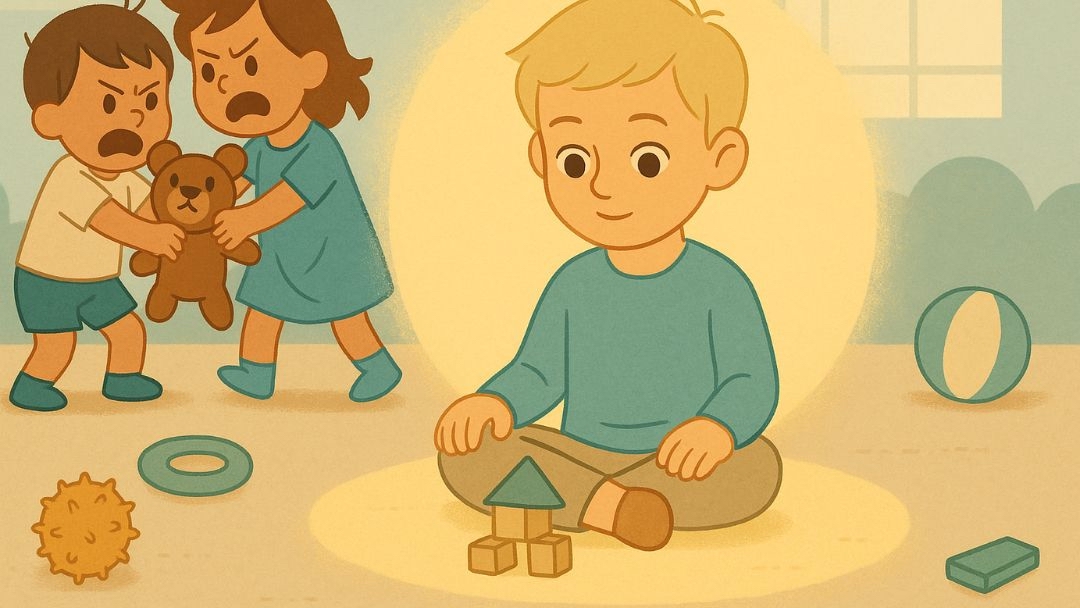Stoic Personality Type: Inside the Minds of People Who Stay Calm When Others Can't
They’re calm when everyone else is spiraling, the coworkers who never panic, the friends who solve instead of stress. Wonder what it really means to be stoic or if you might be one? This article unpacks the signs, strengths, and struggles of a stoic personality.


Back
9 mins read
I've met colleagues who are the walking definition of the classic poker face. You know the type who are unfazed when everyone else is drowning in their feelings. Whether it's working under an impossible deadline or keeping their cool in the face of an emergency, they seem to have mastered the art of staying calm when the world around them is falling apart.
At first glance, they may come off as unemotional, people who wear a mask to keep their feelings locked away where no one can see them. Cold. Detached. Maybe even a little robotic.
But here's what I've learned: that calm-lit exterior hides something far more complex.
The truth about people with a stoic personality isn't that they don't feel, it's that they've learned (or were born knowing) how to hold those feelings differently. They process privately. They stay steady when others shake.
And while the rest of us are venting, crying, or panicking, they're quietly working through it in ways we can't always see.
So what does it really mean to have a stoic personality? What are the signs someone is stoic, and more importantly, are some people just naturally this way, or is it something they learn to be?
Let's dig in.
Stoic Personality vs Stoic Philosophy

Before we go any further, let’s clear something up. When we talk about a stoic personality, we’re not talking about the ancient philosophy of Stoicism. Even though the two share a name and a few core ideas.
Stoicism (capital S), began in ancient Greece and Rome and taught that while we can’t control what happens to us, we can always control how we respond. The Stoics; people like Marcus Aurelius, Seneca, and Epictetus believed real peace comes from living with integrity, reason, and self-discipline.
Their ideas still inspire many modern thinkers, from philosophers like Massimo Pigliucci and Donald Robertson to writers like Ryan Holiday.
A stoic personality, on the other hand, isn’t a philosophy you study but a temperament you live. It’s not a clinical term either, but it describes a familiar pattern: people who instinctively manage their emotions with composure and focus on what they can control.
They might never quote a Stoic philosopher, yet they naturally embody some of the same principles: steadiness, restraint, and quiet strength.
That’s the kind of stoicism we’re discussing in this article. Not an ancient doctrine, but a modern way of being. The calm center in the storm.
So what does that actually look like in everyday life? Let’s break down the traits that reveal a stoic personality in action.
7 Stoic Personality Traits: How to Tell If You Are a Stoic

You recognize stoic personalities by what they don’t do. They don’t overreact, overshare, or get swept away by emotion. Their strength often lies in restraint, in what they hold back rather than what they express.
In emotional intelligence terms, stoic personalities tend to score high in self-regulation — one of the core EQ skills. They can manage stress, stay composed under pressure, and bring calm to chaotic situations. Their emotional steadiness often makes them the grounding force in a group, someone others look to when things feel uncertain.
In personality frameworks, certain types tend to exhibit more stoic tendencies naturally. MBTI types such as INTJ, INTP, ISTJ, and ISTP are often seen as calm, self-contained, and steady under pressure. On the Enneagram, Type 5 (The Observer), Type 1 (The Reformer), and Type 9 (The Peacemaker) often project calm and stability — whether through self-control, detachment, or a desire for peace.
Of course, personality isn’t destiny — any type can develop a stoic outlook through emotional regulation and perspective-taking.
If you’ve ever been told you’re “so calm,” “hard to read,” or “the one everyone leans on,” you might already have a stoic streak. Here are a few signs that point to a stoic personality:
1. You Stay Calm Under Pressure
When crises hit, you're the one people turn to. While your coworkers are spiraling about the looming deadline, you're already breaking the problem into steps. During family emergencies, you're making the hospital calls while everyone else falls apart.
It's not that you don't feel the stress. You do. You just don't let it take the wheel.
2. You Rarely Show Strong Emotions
You love your people. You worry about them. You feel things intensely. However, when it comes to talking about those feelings, it can feel uncomfortable. You are the kind of person who would rather help your friend move apartments than talk about why their relationship ended. You'd rather fix the problem than discuss how it made you feel.
Emotional privacy feels safer than exposure, even with the people closest to you.
3. You Value Control, Especially Over Yourself
You take pride in staying composed. Losing control, whether through anger or tears, feels like giving your power away. While others process their emotions out loud, by calling a friend, or talking it through, you retreat inward. You think. You analyze. You map out solutions in your head.
By the time you're ready to talk about it, you've already worked through it. And honestly? You don’t always see the point in rehashing what’s already been figured out.
4. You Think Before You React
Your first instinct is to pause, observe, and reflect. You’d rather understand a situation fully before responding, which makes your words and actions deliberate. If someone says something offensive in a meeting, you don’t snap back right away.
You notice your initial irritation but give it space to cool before deciding if it’s even worth addressing. To others, this calm might look like detachment, but for you, it’s clarity. You know that reacting in the heat of the moment often creates more problems than it solves.
5. You Prioritize Logic Over Drama
You like peace and order, and you tend to detach from emotionally charged situations. You solve problems with reason, not impulse. When a friend calls in tears about a crisis, your instinct isn’t to match their energy but to calmly help them see the next step.
You listen, ask questions, and focus on what can be done instead of feeding into the chaos.
6. You’re Dependable but Sometimes Distant
People know they can count on you. You’re the calm one when things fall apart, the friend who shows up, listens, and helps others find perspective. But when it’s your turn to need support, you tend to pull back. To you, opening up can feel uncomfortable, almost like losing balance.
So instead, you process things privately, reassuring everyone that you’re fine even when you’re not.
7. You Find Peace in Solitude
Being alone doesn’t scare you, it restores you. Solitude gives you the mental space to think clearly, process emotions, and reset before stepping back into the noise of everyday life. Maybe it’s a long walk after a stressful day, sitting by yourself with music, or enjoying a quiet weekend without feeling the need to explain why.
You recharge by being in your own company, not escaping people but returning to yourself. It’s in those moments of stillness that you feel most grounded and in control.
When Strength Turns into Strain: 5 Downsides of a Stoic Personality

It’s easy to get lost in the noise and bustle of the world we live in, and a stoic mindset can be a powerful tool for staying grounded. People with this temperament often have a high degree of emotional intelligence — they can read a room, manage their reactions, and stay steady when others can’t.
But when that control becomes overprotective, it shifts from awareness to avoidance. Those same strengths can turn into coping mechanisms that keep others — and even your own emotions — at a distance.
Here are a five common pitfalls that stoic personalities often face and how to handle them:
1. Emotional Suppression
When you get so used to staying composed that showing emotion starts to feel wrong, it’s a sign something’s off. Unspoken feelings don’t just fade away, they build quietly until they show up in other ways, like stress, fatigue, or irritability.
Learning to express your emotions safely, even in small ways, helps release that pressure before it takes a toll.
These Tips Will Help You:
- Start with small honesty. Share minor frustrations or joys before tackling bigger feelings. Practice openness in safe, low-stakes moment.
- Express in your own way. Journaling, music, or exercise can help release what words can’t.
- Reframe vulnerability as strength. Remind yourself that emotion doesn’t erase composure but adds depth to it.
2. Difficulty Forming Deep Emotional Connections
Because you rarely show what you feel, people may find it hard to connect with you beyond the surface. Loved ones might mistake your calm for distance or indifference. You may want closeness, but your self-containment builds invisible walls.
A great skill to learn at this point is mastering connection without oversharing. People need to see enough of your inner world to feel trusted.
These Tips Will Help You:
- Name what matters. When someone helps or supports you, saying it directly: “I appreciate you” goes a long way.
- Share perspective, not performance. You don’t have to “open up” dramatically. Simply talking through your thought process can still create a connection.
- Practice small reciprocity. When someone shares something personal, mirror that trust with something of your own.
3. Being Misunderstood as Detached or Uncaring
You may care deeply, but your controlled demeanor can make it seem like you don’t. When you stay quiet in emotional situations, people might think you’re distant or uninterested.
Remember, people won’t always see what you’re managing internally.
These Tips Will Help You:
- Acknowledge out loud. A simple “I can see this is really hard for you” helps people feel seen.
- Use micro-reassurance. Eye contact, nodding, or a brief touch on the arm can communicate empathy when words don’t come easily.
- Let timing work for you. If expressing emotion in the moment feels unnatural, follow up later. A thoughtful text or quiet check-in counts.
4. Trouble Asking for Help
Self-reliance feels natural to you. You’re used to holding things together, so reaching out for support feels like weakness. But even strength needs rest. Admitting you’re struggling doesn’t make you less capable. Instead, it makes you human.
These Tips Will Help You:
- Redefine asking as collaborating. You’re not burdening people; you’re giving them a chance to show up for you.
- Start small. Ask for input or assistance on something simple before bigger requests.
- Notice your limits early. If you’re tired or overwhelmed, reach out before you hit burnout. Not after.
5. Neglecting Emotional Growth
Logic often takes the lead, making emotions feel secondary. Yet emotional awareness, understanding, naming, and processing what you feel is just as important as restraint.
Finding that balance helps you move through life with more ease.
These Tips Will Help You:
- Build emotional vocabulary. When you can name what you feel, you can manage it more clearly.
- Reflect, don’t just reason. Instead of asking “Why did that happen?” try “How did that make me feel?”.
- Seek feedback. Trusted friends, mentors, or therapists can help you see blind spots and encourage growth without judgment.
Are Stoic People Born or Made?

Psychologists and philosophers alike suggest that stoic tendencies can stem from both temperament and experience. For some, it’s wired in. An inborn sensitivity to emotional control and order.
These people may have been calm, observant children who rarely acted impulsively. They find comfort in structure and naturally think before reacting.
For others, stoicism is learned. It becomes a way to cope with chaos, uncertainty, or emotional pain. Over time, staying calm and appearing “unbothered” feels safer than vulnerability.
What starts as self-protection can evolve into identity.
In reality, it’s often a blend of both. A naturally steady temperament might meet a life that reinforces self-reliance. Together, they shape someone who values inner peace above all else, not because they never feel deeply, but because they’ve learned to navigate life from a place of control and reflection.
Stoic Personality vs Emotionally Unavailable

At first glance, stoic people can seem emotionally unavailable. But they’re not.
Emotionally unavailable people pull back from closeness because it feels unsafe or overwhelming. Think of that partner who changes the subject when things get personal, or a friend who disappears when emotions run high.
That’s emotional unavailability. Their distance protects them from vulnerability.
Stoic personalities, in contrast, stay present but composed. They’re the friend who listens quietly before offering thoughtful advice. They don’t avoid feeling but regulate it. Their calm is deliberate, not defensive.
I’d simply say the difference strictly lies in their intent. The stoic calm is chosen self-control, while emotional detachment is unconscious avoidance. One creates stability, while the other creates distance.
Final Thoughts: Finding Balance in Your Stoic Nature

The stoic mindset reflects real wisdom — the understanding that not everything deserves a reaction. But even wisdom needs warmth. Still waters only stay alive when they move.
After learning to master restraint, the next step is learning when to soften it. Strength doesn’t always mean silence. Let people in, even a little. Share what you’re thinking before it hardens into distance. Practice vulnerability the same way you practice composure.
The goal isn’t to change who you are, but to live your calm with self-awareness and flexibility. Assessing your emotional intelligence can help you understand where that balance stands — how strong your self-regulation is, and where openness or empathy could grow.
You’ll also see echoes of this steady temperament across modern personality systems. In the Big Five, it often aligns with low Neuroticism and high Conscientiousness. In the MBTI, many introverted Thinkers — ISTJ, INTJ, INTP — show similar emotional control. And in the Enneagram, it may appear in Types 5, 9, or 1, whose focus on reason, calm, or principle mirrors stoic strength.
However you label it, the stoic spirit points to one truth: strength that listens before it speaks. Its beauty lies in steadiness — but its real power grows when paired with openness, when you allow both strength and softness to coexist. That’s where balance, peace, and genuine connection begin.


Return to Blog





